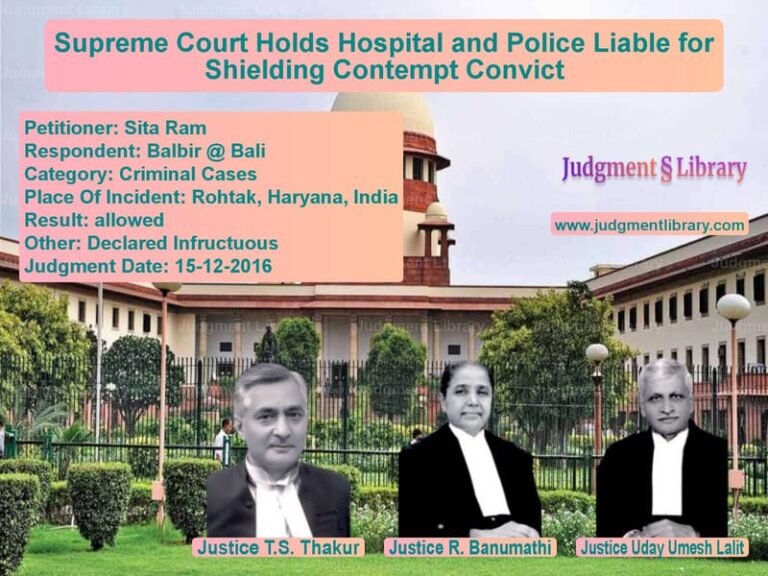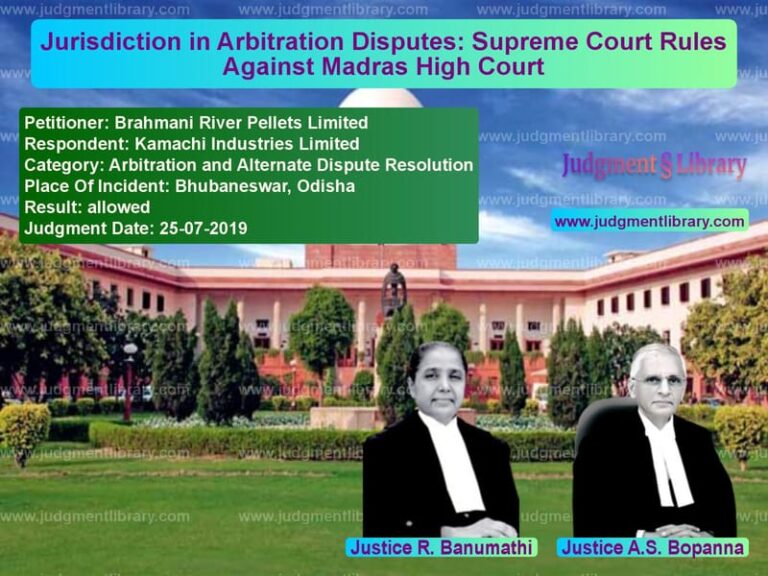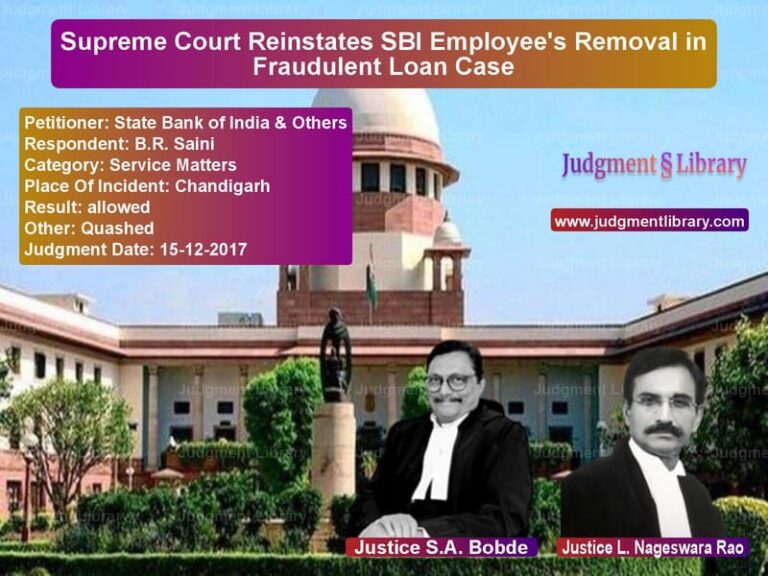Jamnagar Municipal Corporation vs. R.M. Doshi: Supreme Court Reinstates Dismissal Order
The case of Municipal Commissioner, Jamnagar Municipal Corporation vs. R.M. Doshi is a landmark judgment where the Supreme Court of India addressed the issue of dismissal from public service and the legality of delegation of disciplinary powers in municipal corporations. The Supreme Court’s ruling focused on whether the Municipal Commissioner had the authority to dismiss an employee and whether subsequent ratification by the General Board of the corporation could validate such an order.
This judgment is crucial for understanding the principles of administrative law, delegation of powers, and the process of disciplinary actions within municipal bodies.
Background of the Case
The case involved the dismissal of R.M. Doshi, a City Engineer employed with the Jamnagar Municipal Corporation, following allegations of irregularities in road construction and other municipal works. The disciplinary proceedings were initiated based on an inquiry report that found Doshi guilty of misconduct. The Municipal Commissioner issued a dismissal order on December 7, 1998.
Doshi challenged his dismissal before the Gujarat High Court, arguing that the Municipal Commissioner lacked the authority to issue such an order. The Single Judge of the High Court ruled in Doshi’s favor, quashing the dismissal order and granting him full reinstatement with benefits. This decision was later upheld by the Division Bench of the Gujarat High Court, prompting the Jamnagar Municipal Corporation to approach the Supreme Court.
Arguments Presented
Arguments by the Petitioner (Jamnagar Municipal Corporation)
- The corporation contended that Resolution No. 51 dated 20.11.1998 authorized the Municipal Commissioner to take action against officers involved in irregularities.
- They argued that even if the Commissioner lacked original authority, the General Board ratified the dismissal order via Resolution No. 56 dated 15.12.1998 and an amendment on 30.12.1998, making the order legally valid.
- The petitioner relied on the Supreme Court ruling in National Institute of Technology vs. Pannalal Choudhury, where retrospective ratification by a competent authority was held valid.
Arguments by the Respondent (R.M. Doshi)
- Doshi contended that the Municipal Commissioner lacked statutory power to dismiss him under the existing municipal rules.
- He argued that Resolution No. 51 applied only to procurement-related irregularities and not to general disciplinary actions.
- The respondent cited Marathwada University vs. Seshrao Balawant Rao Chavan, arguing that an act void ab initio cannot be ratified subsequently.
- As an alternative argument, the respondent submitted that he was already 75 years old and had been receiving a subsistence allowance since 2012; hence, reinstatement would not be practically beneficial.
Supreme Court’s Observations
The Supreme Court thoroughly examined the legality of the Municipal Commissioner’s actions and the subsequent ratification by the General Board. The key observations included:
- “The Commissioner was authorized to take action against erring officers with respect to lapses in purchases only, as per Resolution No. 51.”
- The Court acknowledged that while the original dismissal order may have lacked proper authorization, the ratification by the General Board cured any procedural defects.
- The ruling in National Institute of Technology vs. Pannalal Choudhury was considered binding, reaffirming that an initially unauthorized action can be validated through proper ratification.
- The Court distinguished this case from Marathwada University, stating that the dismissal was not void ab initio but was merely an irregular exercise of power, which was later validated.
- Considering the respondent’s age and long period out of service, the Court ruled that any payments received under interim orders should not be recovered.
Final Judgment
The Supreme Court ruled in favor of the Jamnagar Municipal Corporation, stating:
- The Gujarat High Court’s decision quashing the dismissal order was incorrect.
- The General Board’s ratification made the dismissal legally valid.
- The dismissal order was reinstated.
- The subsistence allowance received by Doshi since 2012 would not be recovered.
Key Takeaways from the Judgment
- Delegation of Power: Municipal commissioners must act within the scope of delegated authority, but improper actions can be ratified by a competent authority.
- Ratification of Actions: An unauthorized decision, if later approved by a competent authority, can be considered legally valid.
- Judicial Review of Administrative Actions: Courts must distinguish between void and voidable actions when reviewing administrative decisions.
- Employee Rights vs. Organizational Discipline: While procedural fairness is essential, employees cannot escape liability solely based on technical procedural errors.
This ruling sets an important precedent for municipal governance, emphasizing the role of proper authorization in disciplinary actions while allowing for corrective ratifications to ensure administrative efficiency.
Petitioner Name: Municipal Commissioner, Jamnagar Municipal Corporation.Respondent Name: R.M. Doshi.Judgment By: Justice M.R. Shah, Justice J.B. Pardiwala.Place Of Incident: Jamnagar, Gujarat.Judgment Date: 02-05-2023.
Don’t miss out on the full details! Download the complete judgment in PDF format below and gain valuable insights instantly!
Download Judgment: municipal-commission-vs-r.m.-doshi-supreme-court-of-india-judgment-dated-02-05-2023.pdf
Directly Download Judgment: Directly download this Judgment
See all petitions in Disciplinary Proceedings
See all petitions in Public Sector Employees
See all petitions in Termination Cases
See all petitions in Judgment by Mukeshkumar Rasikbhai Shah
See all petitions in Judgment by J.B. Pardiwala
See all petitions in allowed
See all petitions in supreme court of India judgments May 2023
See all petitions in 2023 judgments
See all posts in Service Matters Category
See all allowed petitions in Service Matters Category
See all Dismissed petitions in Service Matters Category
See all partially allowed petitions in Service Matters Category







